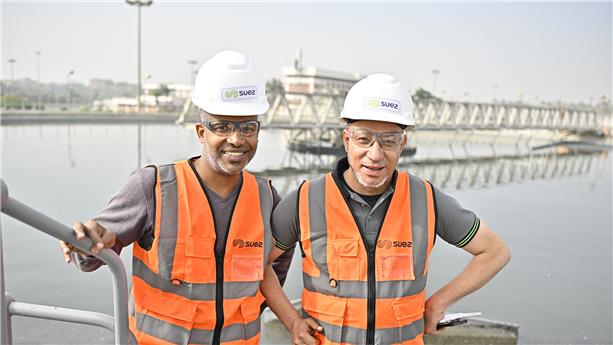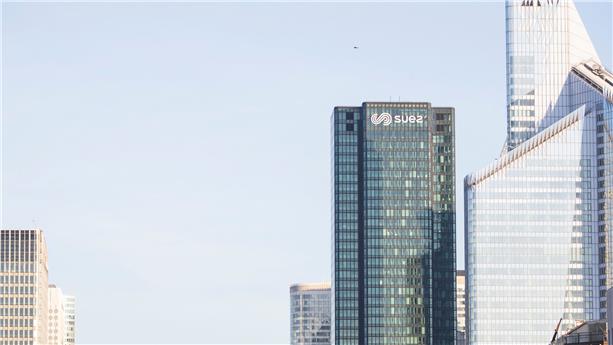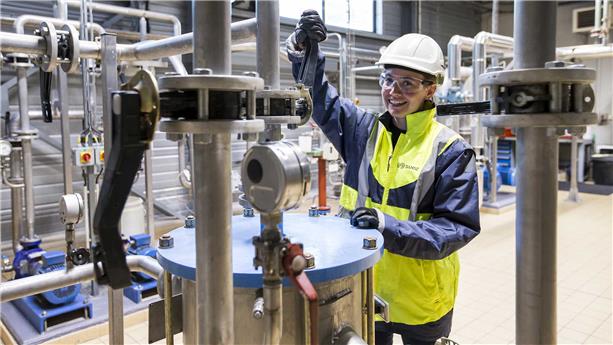
SUEZ unveils its new sustainability goals
- In terms of climate commitments, the Group is developing a global approach across three levers:
- Contributing to decarbonising energy: reaching electrical self-sufficiency in Europe in 2023 and throughout the duration of the plan; between now and 2030, raising the proportion of renewable energy as a share of the Group’s total electricity consumption to 70% worldwide and 100% in Europe, compared to the current average of 24%.
- Reducing its greenhouse gas (GHG) emissions as well as those of its value chain: reduction of emissions from its water activities by almost 40% by 2030 and from its waste activities by more than 25% by 2030 (excluding energy from waste).
- Adapting top-priority and vulnerable sites operated by the Group to the effects of climate change.
- On the social front, the Group wishes to contribute to a responsible economy through employment and local development within communities, as well as encourage the development and engagement of its people through employee share ownership.
- Alongside the climate and social responsibility pillars, the Group is stepping up its initiatives in the field of biodiversity, with 10 specific commitments.
- A solid governance framework has been created through 43 performance indicators dedicated to monitoring the implementation of these commitments. All the indicators will be shared once a year to publicly communicate on the progress made by the Group with respect to these commitments.
Through its business activities in water cycle management and waste recycling and recovery, SUEZ plays a key role in addressing communities’ sustainability issues.
Under its new corporate strategy presented in September 2022, SUEZ wishes to go even further by setting ambitious goals on each of the three pillars. For the very first time, SUEZ is making equally strong commitments in each of the three areas of climate, biodiversity and the preservation of social responsibility.
The Group consequently makes the following commitments:
a) Climate
- Contribute to decarbonising energy, by:
- Increasing the proportion of renewable energy as a share of the Group’s total consumption, to 70% worldwide and 100% in Europe by 2030, compared to the current average of 24%, by harnessing its own power generation capacities and new renewable energy supply contracts (solar and wind power).
- Increasing electricity generation on the Group’s own sites with the ambitious target of becoming self-sufficient for electricity in 2023 in Europe, and to remain as such throughout the plan.
- Contributing to communities’ low-carbon transition, by enabling communities to benefit from a locally sourced and renewable energy generated by the Group’s waste management activities and, furthermore, by reducing the greenhouse gas (GHG) emissions generated by its own energy consumption.
- Reduce the greenhouse gas (GHG) emissions from its own activities and from the sites that the Group operated on behalf of its clients:
- Cut the emissions of its Water activities by 40% by 2030, by improving the operational and energy efficiency of its operational process.
- Cut the emissions of its Waste activities by 25% by 2030 (excluding energy from waste).
- Improve, through innovation, the environmental performances of its energy from waste activities: the Group will invest an extra 40 million euros in its R&D programme dedicated to carbon capture and storage (CCS).
- Lastly, adapt the most exposed sites to the consequences of climate change: the Group undertakes to cover 100% of its high-priority and vulnerable sites between now and 2027 through an established and funded action plan.
- Increasing the proportion of renewable energy as a share of the Group’s total consumption, to 70% worldwide and 100% in Europe by 2030, compared to the current average of 24%, by harnessing its own power generation capacities and new renewable energy supply contracts (solar and wind power).
- Increasing electricity generation on the Group’s own sites with the ambitious target of becoming self-sufficient for electricity in 2023 in Europe, and to remain as such throughout the plan.
- Contributing to communities’ low-carbon transition, by enabling communities to benefit from a locally sourced and renewable energy generated by the Group’s waste management activities and, furthermore, by reducing the greenhouse gas (GHG) emissions generated by its own energy consumption.
- Cut the emissions of its Water activities by 40% by 2030, by improving the operational and energy efficiency of its operational process.
- Cut the emissions of its Waste activities by 25% by 2030 (excluding energy from waste).
- Improve, through innovation, the environmental performances of its energy from waste activities: the Group will invest an extra 40 million euros in its R&D programme dedicated to carbon capture and storage (CCS).
b) Conservation of biodiversity
To reduce the impact of its activities, the Group is making commitments that address the five direct drivers of biodiversity loss as identified by IPBES:
- Combating soil artificialization: the Group pledges to double each year up to 2027 the restored land that it operates.
- Resource use and over-exploitation: between now and 2027 in all its new drinking water supply contracts, the Group will propose a water saving programme aiming to save up to 10% of water supplied. The Group also aims to ensure that 100% of drinking water activities in water stressed zones are covered by a water saving plan. In terms of waste management, the Group intends to improve waste sorting in its facilities.
- Climate change: see Group’s commitments on climate.
- Pollution: between now and 2027, the Group will stop using phytosanitary products on all the sites that it owns or operates, and will propose whenever possible, in all its new wastewater treatment contracts, solutions to eliminate microplastics and micropollutants.
- Invasive exotic species: between now and 2027, the Group will systematically use local species in all its restoration and landscaping operations.
c) Social responsibility
With its partners and clients, the Group undertakes to seek a balance between human and economic development, as well as increase the positive impact of its activities, in particular in the following areas:
- Meet the target of zero severe accidents in the area of occupational health and safety.
- Contribute to a responsible economy through employment and local development within communities, specifically:
- by increasing the proportion of local companies among the Group’s suppliers,
- by allowing 5,000 people per year by 2027 to benefit from our social integration programs,
- by increasing the proportion of expenditure channelled towards inclusive organisations, for example those which employ disadvantaged people.
- Encourage the development and engagement of its employees: following a first step in 2022 which took employee share ownership to 3% of the company’s share capital (1), the Group will increase the employee shareholding to 10% by 2029. Furthermore, the Group has set itself the goal, as of 2023, of offering 80% of its employees an annual training opportunity.
These commitments will be implemented across all the Group’s activities and in all the geographies in which it operates. It will be supported by a solid governance framework at Group level. The Executive Committee will oversee the delivery of the roadmap, and the Group’s shareholders will monitor its deployment by means of a quarterly CSR committee made up of representatives. Within the framework of the annual non-financial performance statement of the Group, an annual review of the roadmap will be prepared including an audit by an independent third party of the main commitments.


